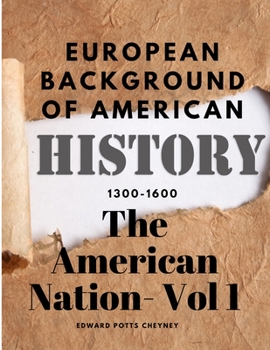The American Nation- Vol 1 - European Background Of American History (1300-1600)
"This first volume of the series supplies a needed link between the history of Europe and the history of early America; for whether it came through a Spanish, French, English, Dutch, or Swedish medium, or through the later immigrants from Germany, from Italy, and from the Slavic countries, the American conception of society and of government was originally derived from the European. Hence the importance at the outset of knowing what that civilization was at the time of colonization. Professor Cheyney (chapters i. and ii.) fitly begins with an account of mediaeval commerce, especially between Europe and Asia, and the effect of the interposition of the Turks into the Mediterranean, and how, by their disturbance of the established course of Asiatic trade, they turned men's minds towards other routes to Asia by sea. Thence he proceeds to show (chapter iii.) how the Italians in navigation and in map-making exhibited the same pre-eminence as in commerce and the arts, and why Italy furnished so many of the explorers of the western seas in the period of discovery. It is an easy transition in chapter iv. to the dramatic story of the efforts of the Portuguese to reach India round Africa. The next step is to describe in some detail (chapters v. and vi.) the system of government and of commerce which existed in Spain, France, and Holland in the sixteenth century; and the book will surprise the reader in its account of the effective and far-reaching administration of the Spanish kingdom, the mother of so many later colonies. This discussion is very closely connected with the account of Spanish institutions in the New World as described by Bourne in his Spain in America (volume III. of the series), and we find the same terms, such as "audiencia," "corregidor," and "Council of the Indies" reappearing in colonial history. A much-neglected subject in American history is the development of great commercial companies, which, in the hands of the English, planted their first permanent colonies. To this subject Professor Cheyney devotes two illuminating chapters (vii. and viii.), in which he prints a list of more than sixty such companies chartered by various nations, and then selects as typical the English Virginia Company, the Dutch West India Company, and the French Company of New France, which he analyzes and compares with one another. It is significant that not one of these companies was Spanish, for that country retained in its own hands complete control both of its colonies and of their commerce."
Related Subjects
History




